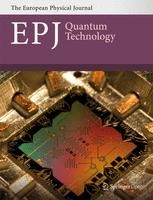Access to burgeoning quantum technology field could be widened by open master educational model
Quantum technology offers major societal benefits, but its growth depends on the supply of a qualified workforce.
New York | Heidelberg, 4 March 2024
 Quantum Technology is based on the engineering of devices that make use of the quantum properties of matter. One of the most prominent avenues of this technology is quantum computing, which may be able to leverage quantum bits (qubits) to perform calculations more efficiently than classical computers. Technology with this “quantum advantage” will also operate in the background of our lives, providing ultra-secure communications and high-precision sensors and clocks.
Quantum Technology is based on the engineering of devices that make use of the quantum properties of matter. One of the most prominent avenues of this technology is quantum computing, which may be able to leverage quantum bits (qubits) to perform calculations more efficiently than classical computers. Technology with this “quantum advantage” will also operate in the background of our lives, providing ultra-secure communications and high-precision sensors and clocks.
The applications of quantum technology have led to a boom in investment worldwide; with this technology expected to have a huge societal impact. But to maintain this burgeoning industry, it is crucial that graduates with training in quantum technology enter the workforce. Plus, for the European Union to stay ahead in the quantum tech race, the workforce must assemble on a much shorter timescale than the 3 to 5 years (or more) of a PhD program.
In a new paper in EPJ Quantum Technology, author Simon Goorney, from Aarhus University, Denmark, and his co-authors describe the development of Open Master, a new form of transnational education, that could serve as a means of enhancing accessibility to specialist expertise in quantum technology. The ultimate goal of the pilot scheme, which operated over the academic year of 2021 to 2022, was to use the experience to conceptualise a model for the future of quantum technology education.
Through research conducted during the setup and operation of a pan-European pilot project dubbed the QTEdu Open Master (QTOM), the team examined the viability of this educational model and its capacity to offer flexible learning opportunities to STEM Master’s students through the setup and year-long operation of an online course exchange platform.
“QTOM was an experimental pilot project of the Quantum Flagship’s education community. It was run by a group of volunteers from universities across Europe, with the goal being to explore and develop a model for the future of higher education in Quantum Technology,” Goorney said. “QTOM was a great success, as the model, the open master, has formed the basis of a 17.6 million Euro project in which many new Master’s programs are being developed.”
Goorney explained that the open master model is characterised by an ecosystem of courses shared across borders, accessible for students of any STEM (or even non-STEM) degree program to study for credit.
“It is the ‘for credit’ part which was the greatest challenge for QTOM because the majority of students were taking courses from outside of their university, even their country,” he continued. “They then had to go back to their local representative, who had to find a way to grant them credits for studying in this format. We call that process local accreditation, referring to the process of generating credit for external courses.”
According to Goorney, the creativity of institutions and teaching staff in creating these local accreditation models came as a big surprise, demonstrating how large of a factor in the success of QTOM was the degree of support provided to the partners by their departments and administration.
The authors say that the central message of the QTOM pilot is that the very process of engaging with such an international experiment generates value independent purely of its degree of success. In their case, it may have helped in some way towards building the European quantum industry.
Reference: Goorney, S., Sarantinou, M. & Sherson, J. The Quantum Technology Open Master: widening access to the quantum industry. EPJ Quantum Technol. 11, 7 (2024). https://doi.org/10.1140/epjqt/s40507-024-00217-1
Services for Journalists
The full article is available here.
Contact
Sabine Lehr | Springer | Physics Editorial Department
tel +4962214878336 | sabine.lehr@springer.com
